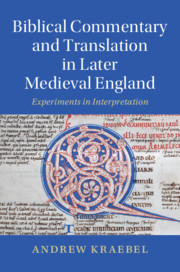
-
Select format
-
- Publisher:
- Cambridge University Press
- Publication date:
- February 2020
- March 2020
- ISBN:
- 9781108761437
- 9781108486644
- 9781108708128
- Dimensions:
- (228 x 152 mm)
- Weight & Pages:
- 0.65kg, 322 Pages
- Dimensions:
- (229 x 152 mm)
- Weight & Pages:
- 0.47kg, 324 Pages
- Subjects:
- Literature, Anglo Saxon and Medieval Literature
- Series:
- Cambridge Studies in Medieval Literature (109)
You may already have access via personal or institutional login- Subjects:
- Literature, Anglo Saxon and Medieval Literature
- Series:
- Cambridge Studies in Medieval Literature (109)
Book description
Drawing extensively on unpublished manuscript sources, this study uncovers the culture of experimentation that surrounded biblical exegesis in fourteenth-century England. In an area ripe for revision, Andrew Kraebel challenges the accepted theory (inherited from Reformation writers) that medieval English Bible translations represent a proto-Protestant rejection of scholastic modes of interpretation. Instead, he argues that early translators were themselves part of a larger scholastic interpretive tradition, and that they tried to make that tradition available to a broader audience. Translation was thus one among many ways that English exegetes experimented with the possibilities of commentary. With a wide scope, the book focuses on works by writers from the heretic John Wyclif to the hermit Richard Rolle, alongside a host of lesser-known authors, including Henry Cossey and Nicholas Trevet, and many anonymous texts. The study provides new insight into the ingenuity of medieval interpreters willing to develop new literary-critical methods and embrace intellectual risks.
Awards
Winner, Ecclesiastical History Society's Annual Book Prize for a First Monograph, Ecclesiastical History Society
Winner, 2024 John Nicholas Brown Prize, Medieval Academy of America
Reviews
‘… these works adapted scholastic exegesis to meet the devotional needs of English readers … Recommended.’
D. A. Brown Source: Choice
‘This is a highly rewarding book. Kraebel deals with a complex subject with the utmost clarity and competence. He has added important insights and conclusions of his own which enrich our understanding of a field far broader and more interesting than the reformers would admit.’
Alastair Hamilton Source: Journal of Ecclesiastical History
‘… Kraebel excavates the wider field of scholastic biblical exegesis in fourteenth-century England … Kraebel is to be commended for having reclaimed so much of later medieval England’s biblical commentary from obscurity as well as for having analyzed these texts and their manuscripts so closely and carefully.’
Audrey Southgate Source: Journal of Medieval Religious Cultures
‘Kraebel’s admirable study does much to help, and to show how those implications might be not reductive, but rather stimulating and fruitful. Potential readers should take the plunge: the rewards justify the effort.’
Daniel Sawyer Source: Studies in the Age of Chaucer
‘Kraebel’s compelling study is intensely learned, succinct, and marked by careful attention to the manuscript evidence and textual details. At the same time, Kraebel draws convincing conclusions as to the implications of this evidence for our broader understanding of scholastic hermeneutics in fourteenth-century England. This excellent study also reveals the need for further work on many aspects of works such as the Glossed Gospels and Wyclif’s Postilla, and, it is to be hoped, will inspire future research in this crucial field.’
Cosima Clara Gillhammer Source: Anglia
‘Relatively few scholars … achieve their scholarly reputations not only by dint of hard work and insights but also by doing something few medievalists have the time and opportunity to do: read manuscripts in quantity. On the trajectory of his scholarship to date, to that cohort we can add Andrew Kraebel, who shows that scholarly opinion concerning fourteenth-century English commentary on and translation of the Bible is superficial and often wrong. … [Kraebel] supplies examples of nuanced sophistication on almost every page.’
James H. Morey Source: Journal of English and Germanic Philology
‘This is a book that specialists will find worth revisiting.’
Patrick Hornbeck Source: Renaissance Quarterly
Contents
Metrics
Altmetric attention score
Full text views
Full text views help Loading metrics...
Loading metrics...
* Views captured on Cambridge Core between #date#. This data will be updated every 24 hours.
Usage data cannot currently be displayed.
Accessibility standard: Unknown
Why this information is here
This section outlines the accessibility features of this content - including support for screen readers, full keyboard navigation and high-contrast display options. This may not be relevant for you.
Accessibility Information
Accessibility compliance for the PDF of this book is currently unknown and may be updated in the future.


